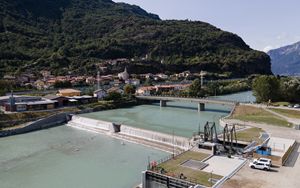(Finance) – Edison inaugurates the new Quassolo hydroelectric power plant, in the province of Turin, taking a further step forward in the development of renewable source plants and in achieving the decarbonisation objectives set at national and European level. The Quassolo power plant, located along the left bank of the Dora Baltea river, is a small-scale flowing water plant with an installed power of 2,700 kW and a producibility of 8,300,000 kWh per year, capable of satisfying energy needs of approximately 3,000 families and to avoid the emission into the atmosphere of 3,300 tons of CO2 per year. Residents of the municipalities of Quassolo, Borgofranco di Ivrea, Quincinetto, Tavagnasco, Montalto Dora and Settimo Vittone also participated in the construction of the plant, as well as Edison Energia customers from all over Italy, adhering to the Edison Crowd crowdfunding campaign for Quassolo launched by the Group in 2022 and thus choosing to become protagonists of the energy transition of their territory. Participants in the initiative are paid a fixed annual gross interest (equal to 6% for citizens of the six municipalities and 5% for Edison customers) on the sums invested, every six months starting from 30 April 2022 until 30 April 2025. Edison was the first energy operator in Italy to launch initiatives of this type already in 2018, successfully concluding three crowdfunding campaigns.
“We are proud to take, with the inauguration of the new Quassolo hydroelectric power plant, a further step forward in the country’s decarbonisation process and in achieving our development targets for 2030, which aim to increase the installed renewable power up to 6 GW through 5 billion euros in investments – he declares Nicola Monti, CEO of Edison –. For 140 years we have been a responsible operator, committed to the economic and social development of local communities with a long-term perspective. Thanks to the crowdfunding initiative, citizens were able to approach energy issues and participate actively in the country’s energy transition, experiencing first-hand the benefits deriving from the construction of a plant of this type on their territory”.
“We have been a leading responsible operator in the energy transition for 140 years and we want to continue to be so, bringing renewable generation to 40% of our production mix. An effort in which hydroelectric plays a highly strategic role, being the first source of renewable energy of the country and boasting an industrial supply chain that sees Italy among the first in the world – he declares Marco Stangalino executive vice president and director of Power Asset Edison –. In recent years we have been among the few operators who have continued to invest and build new mini-hydroelectric plants, just like this one in Quassolo, which allows the production of green energy to serve the territories”.
As proof of the success achieved and the enthusiastic participation of the crowdfunding participants, lThe collection target for the financing of the Quassolo power plant is equal to 300,000 euros – Edison said in a note – it was achieved in just 20 days and even earlier than the initially established deadline. As part of this initiative, Edison has made its know-how and skills as a historic hydroelectric operator available to the territory to generate value for people and the territory, through an innovative and sharing approach. For Edison the green energy crowdfunding it is a tool capable of offering everyone the opportunity to be promoters of change and sustainability in their territory.
The power plant was built in just 19 months, under the direction of Edison’s Engineering Division. During the design phase of the plant, particular attention was paid to the impacts on the territory and the conservation of the landscape context, with the aim of ensuring the natural ecological integrity of the Dora Baltea river, confirming Edison’s commitment to the protection of the ‘environment. The idea for the project was born in 2013, while construction work began in November 2021 and concluded in June 2023. Around 150 workers, 20 engineers and 12 specialized companies worked on the construction site, for a total of over 65,000 hours work. The total investment was 12 million euros.
